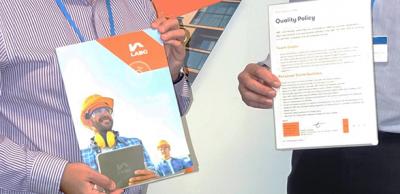T Levels shaping the future for next generation of industry professionals
Articled updated 15/9/20 - first published in 2018
“Everyone should be able to have access to an education that suits them, but we know that for those that don’t choose to go to university, the routes into further technical and vocational training can be hard to navigate. That’s why we’re making the most significant reform to advanced technical education in 70 years to ensure young people have gold standard qualifications open to them whichever route they choose.” - Prime Minister, Theresa May.
The first schools and colleges to teach new technical qualifications called T levels have been announced. T Levels are classroom-based, technical study programmes at level 3, designed to support entry to skilled employment in technical occupations at level 3 and above. A substantial, high quality industry placement with an external employer will be an essential part of each T Level.
From 2020, they will offer teenagers in England courses in construction, and each course will include a three-month work placement. These are intended as vocational alternatives to A levels. This placement is intended to arm them with the technical skills they need to give them the best possible chance for entering skilled employment and give students a valuable opportunity to put their learning into practice, develop their technical skills and become more employable.
“Naming the first 52 colleges and providers where young people will be able to study the first T Levels is an important step forward, and we will continue the work with business and the education sector so everyone can benefit from these vital reforms. Technology and the world economy are fast-changing, and we need to make sure our young people have the skills they need to get the jobs of tomorrow. This is at the heart of our modern Industrial Strategy.” - Secretary of State, Damian Hinds.
The work placement process is currently being trialled, with colleges being provided incentives to find willing employers. The challenge is working with the Department for Education to launch work placements, giving 16-19 year old Level 2 or 3 Technical Education students a valuable opportunity to put their learning into practice, and responding to employer needs for new recruits to be work ready. This is a unique opportunity to be involved in the pilot phase, running mainly across London, the West Midlands and the North West, and shape the future of work placements.
Employers should be able to:
- Provide a 40 day minimum work placement for a student on a relevant course. The structure will be based on the needs of the local provider and could include 10-20 weeks of 2-4 days a week.
- Ensure there is a safe work environment and opportunities for the student to develop their technical skills within your industry.
- Provide a line manager to support, supervise and mentor the student.
Recent update (September 2020)
The first construction-related T level announced for September 2020 is the two-year Designer, Surveying and Planning for Construction. Others will follow 2021-2023 onwards.
Further information
Find out more about the qualifications (for students and employers.)
Sign up to the building bulletin newsletter
Over 48,000 construction professionals have already signed up for the LABC Building Bulletin.
Join them and receive useful tips, practical technical information and industry news by email once every 6 weeks.
Subscribe to the Building Bulletin




Comments
Add new comment